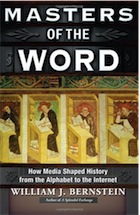Masters of the Word - How Media Shaped History from the Alphabet to the Internet.
In Masters of the Word William Bernstein takes the reader on a journey through human history exploring the relationship between innovations in media and the shifts in political power. His thesis is that the ruling classes have exercised influence over the masses through control of access to the media, and that the democratisation of the media is a key factor in giving the masses a greater say in how they are ruled.
In the ancient world through to the late Middle Ages, literacy gave power and the educated elite jealously guarded the influence that it brought. The very ability to be able to record transactions paved the way to a legal system that could resolve disputes peacefully - a legal system that ensured that power remained with the literate few. Most importantly, literacy allowed rulers to exert influence over greater distances. Hence the invention of writing and later the alphabet enabled the Summerians to establish the first empire and the relatively high levels of literacy in the Roman Army to rule from Britain to the Middle East. The importance of a literate educated elite in Christianity and Islam ensured the influence of religion. Indeed the Church of Rome retained its power through operating in Latin rather than the vernacular - thus establishing an international language for itself whilst putting up a barrier between it and most of the population.
Bernstein is creative in the way in which he takes episodes from history to illustrate the part that new media have played in changing the relationship between rulers and the ruled.
Printing Press. Gutenberg's printing press combined with greater vernacular literacy allowed Luther to challenge the power of Rome, where others (Huss and Wycliffe) has failed. The rise of Fleet Street in Britain and the one-penny presses increasingly held rulers to account, whereas in Germany, Nazi party control of many of the German newspapers helped them to power.
Radio. Roosevelt's command and skill on the Radio enabled him to win three terms as President; in the hands of Goebbels it was the political weapon that brought together a nation behind Hitler; and in Rwanda, it was the means of orchestrating a genocide. The radio in the form of "the Voices" (the BBC, Radio Liberty, Voice of America and Deutsche Welle) also played an instrumental role in bringing together opposition groups behind the Iron Curtain.
Copiers. One of the strongest parts of the book is where Bernstein documents the lengths to which dissidents in Soviet bloc countries, such as Alexander Solzhenitsyn, used to disseminate their ideas: 'samizdat' (using typing and carbon copying) and 'magnitizat' (using tape recordings). Despite control of the mass media by the Soviet authorities and with the help of "The Voices" these dissidents galvanised opposition that eventually led to the end of communism.
Internet. Bernstein documents the way in which the Internet has brought about a significant shift in power, so that rulers in Western democracies are accountable more than ever before to the ruled (Wikileaks, MPs expenses scandal etc.). The Internet (in the form of Twitter and Facebook) has also played (and continues to play) a significant part in bringing about democratic change in Tunisia and Egypt (Arab Spring). Bernstein is reticent about concluding that the Internet age will bring about world-wide democratic change, arguing (after Lopez Rodo) that, although a contributory factor, it is less significant than increases in prosperity.
There is an interesting technical strand to this book where Bernstein seems to enjoy engaging with the science behind each technological development. He explores in detail the Summerian development of alphabet, the particular typesetting issues that Gutenberg overcame, how radio signals work and were exploited by Hertz and Marconi, and the development of photocopiers.
Masters of the Word is one of those really interesting history books that explores a theme through the Ages, thus giving the reader a novel and interesting perspective on otherwise familiar ground by making new connections. This is seen most clearly as Bernstein traces comparisons between reactions from traditionalists to the introduction of new media, whether that be the scribe Filippo de Strata predicting that the octavos of Ovid cranked out by the "brothel of the printing presses" would make young women wanton, or the criticism of the Internet and amateur bloggers by professional journalists:
"The criticisms you are hearing are the age-old howls of communications elite facing the imminent loss of status and income." (p.323)
One note of caution, if archaeology and the history of language are not your thing then the first section of the book might be a bit dry - do persevere (or skip to the next chapter) - it is worth it. The book, like the media it is discussing, gains momentum as it heads through history. Overall, a very enjoyable summer read.
















No comments:
Post a Comment